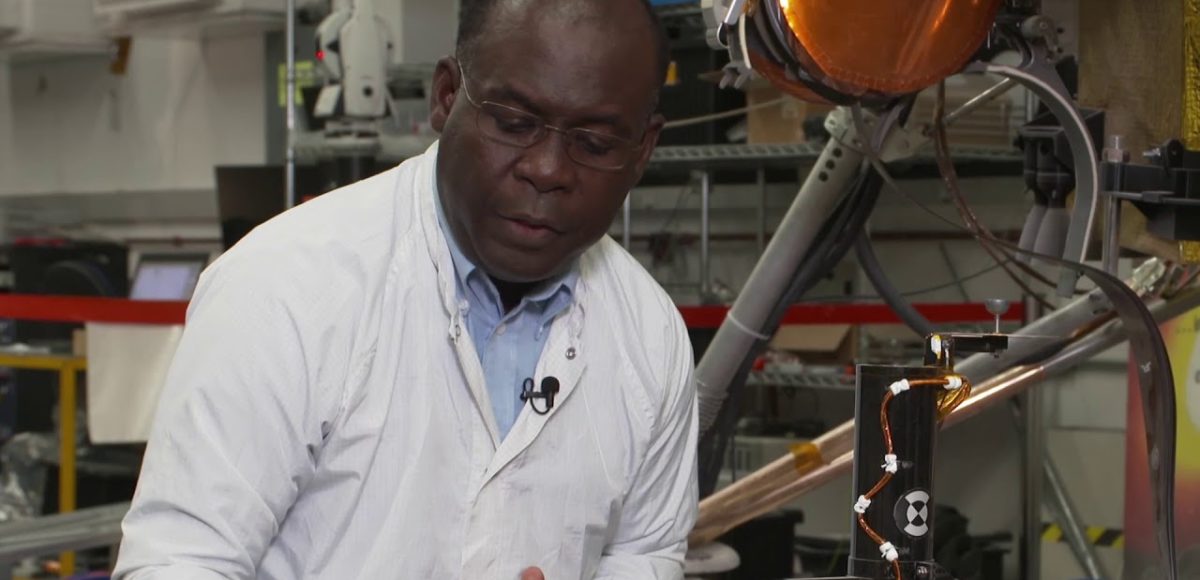Meet the Ghanaian Engineer Instrumental in Getting NASA to Mars
Original Author: Nzekwe Henry
Original Publications: weetracker
Date: 8 January 2019

For space aficionados and enthusiasts of extraterrestrial expeditions, Monday, November 26, 2018, was a symbolic day in that it spelt some kind of victory for the National Aeronautics and Space Administration (NASA) as the agency coordinated the successful landing of InSight – a spacecraft developed by NASA – on the surface of earth’s sister planet; Mars.
As culled from reports by The New York Times, while on the expedition, the spacecraft is expected to give ‘insights’ into the planet’s underworld, seek out tremors that might be suggestive of ‘marsquakes’, as well as provide some information that might explain the formation of the red, dusty planet.

Usually, it would be something of a given to dole out credits to the Americans or Russians for the success of conquest of this magnitude. But this time around, perhaps Ghanaians can pump their fists in jubilation and beat their chests with some pride too. And that’s because if the events of that Monday in November was anything like an earthquake, one of their very own sons was right at the epicentre.
Dr Ashitey Trebi-Ollennu, can take some extra pride and perhaps even give himself a pat on the back for the recent historic landing on Mars. Having risen through the ranks to the position of the team lead for InSight at NASA’s Jet Propulsion Laboratory, the Ghanaian engineer was right in the mix and his remarkable work was instrumental to what has so far been a successful project.
The space engineer led a team of like minds on a project which involved designing and building robots for NASA missions at the agency’s laboratory in California, United States. It appears the Ghanaian genius had always been fascinated by autonomous technology and his dreams eventually came to life with the design and fabrication of a robotic arm that will deploy vital instruments and probes on the spacecraft hundreds of millions of miles away.
Trebi-Ollennu has been an ever-present figure on all things ‘Mars Exploration’ as it concerns NASA projects for quite some time now. From working on the Mars Exploration Rover in 2003 to weighing in with his expertise on the Phoenix aircraft that found water on the planet in 2008, and even putting in his shift at the Mars Science Laboratory in 2011, the engineer has been at the forefront of these otherworldly expeditions that are Mars missions.

Trebi-Ollennu had always been drawn to aeronautics and spacecraft from a very tender age. Growing up in Ghana, he spent most of his early childhood in his family home which coincidentally seated in close proximity to a domestic airport. That may have piqued his earliest interest in flying aircraft and unmanned aerial vehicles. As a child, he is said to have also fantasized about taking humans out of cockpits and flying aircraft remotely.
As time went by, he decided to step up his interest in the field by furnishing himself with some rudimentary knowledge. Before long, he stumbled upon literature related to the “glass cockpit” concept designed for commercial and military aircraft.
Having gobbled up these new bits of information, he caught wind of a theory that entailed imparting machines such as aircraft with a new kind of ‘smartness’ such that they would be able to fly independent of human control, or so that they would be a lot easier to operate. The bulk of his life pursuits are known to hover around that very idea.
Trebi-Ollennu was born in Ghana where he completed his primary education at Garrison Primary School in Burma Camp before moving on to Ghana Secondary Technical School, Takoradi. For his tertiary education, he predictably opted for studies in the aviation sphere having always been fascinated by the field. He obtained a Bachelor-of-Engineering in Avionics from Queen Mary College, University of London, in 1991.
His academic pursuits also took him a step further to the Royal Military College Science located at Cranfield University in the United Kingdom and in 1996, his efforts culminated in success when he bagged a PhD from the institution. In a figurative sense, that was to spell the beginning of his foray into outer space.
During his stint at Carnegie Mellon University which trailed his years of active studentship, he came up with a system that could handle distributed tactical surveillance in All Terrain Vehicles (ATVs). He designed this system for the Defense Advanced Research Projects Agency (DARPA).

Staying to true to his African roots, Trebi-Ollennu founded the Ghana Robotics Academy Foundation (GRAF) in 2011. The Foundation is a non-profit organization that has made it its mandate to pioneer science education in Ghana by organizing practical robotics workshops and competitions for students at both the secondary and tertiary levels.
The vision behind Trebi-Ollennu’s Ghanaian foundation is thought to be motivated by the need to bring young scholars in his home country up to speed with adequate education and competitive technical skills in robotics technology and engineering. The organization has set its sights on igniting the passion of young students for technology and engineering through fever-pitched competition.
The Ghanaian spacecraft engineer is a fellow of a number of institutions including the Royal Aeronautical Society, U.K., Institution of Engineering and Technology, U.K., and Ghana Academy of Arts and Sciences.
In what has been a stellar career laden with accolades and trophies, Trebi-Ollennu has garnered for himself a considerable amount of high-profile recognition. Raiding his trophy cabinet would reveal such prestigious prizes as the NASA Exceptional Engineering Achievement Medal (2008), Sir Monty Finniston Achievement Medal (2007), Outstanding Engineer Award (2007); the JPL Mariner Award (2006), as well as the NASA Group Achievement Award-Mars Exploration Rover Avionics Team (2004), amongst numerous others.

Though Dr Ashitey Trebi-Ollennu can be seen shuttling between his office, the robotics lab, and the flight testbed on a typical workday, he sees his job as much more than just developing new robotics technologies or testing technologies.
“The brilliant thing about my job is that it is not a circumscribed routine, there are different challenges every day,” said Dr Ashitey Trebi-Ollennu, in a conversation with Modern Ghana. “Believe me, it is a lot of fun. NASA is also a great organization that cares about its people and their personal development, need I say more?”
Dr Ashitey Trebi-Ollennu can be considered a highly accomplished visionary with a vast background and extensive practical experience in Space Robotics Systems, Flight Systems Integration & Test, Planetary Rover Operations, and a number of other highly technical fields. He is, without a doubt, one of Africa’s most illustrious sons who are doing the continent proud on the global scene.
Ashitey Trebi-Ollennu, Ph.D, CEng FIEE, SMIEE
Group Supervisor
Chief Engineer
Biography
Dr. AshiteyTrebi-Ollennu, FIET, FRAeS, SMIEE,PMP, FGA, is the Product Delivery Manager, for the InSight Mars Mission Instrument Deployment System, Instrument Deployment System operations Team Chief and a technical group lead in the Robotic Manipulation & Sampling group at NASA Jet Propulsion Laboratory, California Institute of Technology, where he has been since 1999.
Dr. Trebi-Ollennu is a Fellow of the Institution of Engineering and Technology, U. K., and a Fellow of the Royal Aeronautical Society, U.K. Senior Member IEEE RAS and IEEE SMC. Dr. Trebi-Ollennu is also a fellow of the Ghana Academy of Arts and Sciences. His current research at JPL focuses on Planetary Rovers, Manipulation, Multiple Mobile Robots (Planetary Outpost), Reconfigurable Robots and Man-machine Interaction. Dr. Trebi-Ollennu’s research has resulted in more than 95 publications.
Dr. Trebi-Ollennu received the 2008 NASA Exceptional Engineering Achievement Medal for his contributions to the Mars Exploration Rover mission, 2007 Outstanding Engineer Award from IEEE Region 6, 2007 Sir Monty Finniston Achievement Medal from Institution of Engineering and Technology, U.K., 2010 Specialist Silver Award from the Royal Aeronautical Society, U.K. and The 21st Century Trailblazer Award in Systems Engineering from the U.S.A. National Society of Black Engineers, at the 2012 NSBE Aerospace Systems Conference.
Dr. Trebi-Ollennu is a recipient of over a dozen NASA Group Achievement Awards. Dr. Trebi-Ollennu is a Fellow of the Institution of Engineering and Technology, U. K., and a Fellow of the Royal Aeronautical Society, U.K. Senior Member IEEE RAS and IEEE SMC. Dr. Trebi-Ollennu is also a fellow of the Ghana Academy of Arts and Sciences. He has severed as a Guest Editor of the IEEE Robotics and Automation Society Magazine, Special Issue on Mars Exploration Rovers (June 2006).
Dr. Trebi-Ollennu has been on PhD committees at the Robotic Institute of Carnegie Mellon University, Pittsburgh USA. Dr Trebi-Ollennu is the founder of the Ghana Robotics Academy Foundation (GRAF) that won the prestigious Google RISE Award 2013.
Education
Ph.D. in Control Systems Engineering, School of Engineering and Applied
Science, Royal Military College Science, Cranfield University, U.K., 1996. Thesis: Robust Non-linear Control Designs Using Adaptive Fuzzy Systems
B.Eng. in Avionics, Department of Aeronautical Engineering, Queen Mary College, University of London, 1991. Dissertation: Review of 4-D guidance techniques and the simulation of 4-D aircraft guidance.
Research Scholar, Institute for Complex Research Engineered, Carnegie Mellon University , were he helped develop a system of All Terrain Vehicles (ATVs) for distributed tactical surveillance for DARPA.







